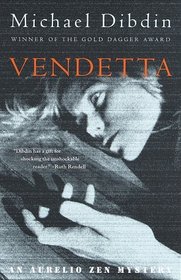Helpful Score: 1
Venice, queen of Italy's radiant cities, is the fictional birthplace of two superb detectives: Donna Leon's Commisario Guido Brunetti, of the Venice police; and the late Michael Dibdin's Aurellio Zen, of Rome's central crime bureau.
Now, thanks to television series, we have screen versions of both: Brunetti has been played by two German actors in the series shot in Venice (in German, which is amusing; with both Uwe Kockisch and earlier, Joachim Krol, as Commisario Brunnetti); while the BBC is producing a series of Zen mysteries (with Rufus Sewell superb as the Machiavellian Zen).
Amazon has several of the BBC's Zen episodes available; they are beautifully filmed on site in Rome.
Take care. If you come to the books from screen versions, you will find a far older, jaded, introverted and subtle Zen. Rufus Sewell's Zen is smarter (in our eyes) than the book Zen, and very unlikely to be caught out so often as the protagonist on the page. As a balance, the smooth and slick Zen of the screen is as often undone by fate and chance as the ungainly Zen on the page seemingly escapes punishments only by the hands of the gods.
But Zen in both venues has the fine Italian mastery of counter-play and double-play, and makes the art and science of seemingly fixing cases by nabbing the real culprits seem far more devious than the most bent copper's record ever could. When the fix must be in, the politicians seems to believe, Zen is the man to do the fixing. Little do they know.
This account, "Vendetta", is a "locked room" mystery throughout, but Dibdin leaves abundant clues so we follow Zen's wanderings, and wonder and wait patiently as he slowly he tries to tie up the obvious loose threads. Fortune and Dibdin deliver a truly deus ex machina ending that fashions as tidy a bow as even Zen at his most wishful could ask. And even Zen's paranoid fantasies turn out to have silver linings.
Book or screen, Zen will have you smiling, chuckling, and laughing out loud at all the fun these Italians, good, bad, and very bad, all seem to have out of life.
Now, thanks to television series, we have screen versions of both: Brunetti has been played by two German actors in the series shot in Venice (in German, which is amusing; with both Uwe Kockisch and earlier, Joachim Krol, as Commisario Brunnetti); while the BBC is producing a series of Zen mysteries (with Rufus Sewell superb as the Machiavellian Zen).
Amazon has several of the BBC's Zen episodes available; they are beautifully filmed on site in Rome.
Take care. If you come to the books from screen versions, you will find a far older, jaded, introverted and subtle Zen. Rufus Sewell's Zen is smarter (in our eyes) than the book Zen, and very unlikely to be caught out so often as the protagonist on the page. As a balance, the smooth and slick Zen of the screen is as often undone by fate and chance as the ungainly Zen on the page seemingly escapes punishments only by the hands of the gods.
But Zen in both venues has the fine Italian mastery of counter-play and double-play, and makes the art and science of seemingly fixing cases by nabbing the real culprits seem far more devious than the most bent copper's record ever could. When the fix must be in, the politicians seems to believe, Zen is the man to do the fixing. Little do they know.
This account, "Vendetta", is a "locked room" mystery throughout, but Dibdin leaves abundant clues so we follow Zen's wanderings, and wonder and wait patiently as he slowly he tries to tie up the obvious loose threads. Fortune and Dibdin deliver a truly deus ex machina ending that fashions as tidy a bow as even Zen at his most wishful could ask. And even Zen's paranoid fantasies turn out to have silver linings.
Book or screen, Zen will have you smiling, chuckling, and laughing out loud at all the fun these Italians, good, bad, and very bad, all seem to have out of life.
"In Italian police inspector Aurelio Zen, Dibdin has given the mystery one of its most complex and compelling protagonists: A man wearily trying to enforce the law in a society where the law is constantly being bent. This time, Zen himself has been assigned to do some low bending. Officials in a high government mimistry want him to finger someone -anyone- for the murder of an accentric billionaire, whose corrupt dealings enriched some of the most exalted figures in Italian politics.
But Oscar Burolo's murder would seem to be not just unsolvable, but impossible. The magnate was killed on a heavily fortified Sardinian estate, where every room was monitored by video cameras. Those cameras captured Burolo's grisly death, but not the face of his killer. And that same killer, elusive, implacable, and deranged, may now be stalking Zen. Inexorable in its suspense, superbly atmospheric, Vendetta is further proof of Dibdin's mastery of the crime nove1."
But Oscar Burolo's murder would seem to be not just unsolvable, but impossible. The magnate was killed on a heavily fortified Sardinian estate, where every room was monitored by video cameras. Those cameras captured Burolo's grisly death, but not the face of his killer. And that same killer, elusive, implacable, and deranged, may now be stalking Zen. Inexorable in its suspense, superbly atmospheric, Vendetta is further proof of Dibdin's mastery of the crime nove1."




![header=[] body=[Get a free book credit right now by joining the club and listing 5 books you have and are willing to share with other members!] Help icon](/images/question.gif?v=90afaeb39)
